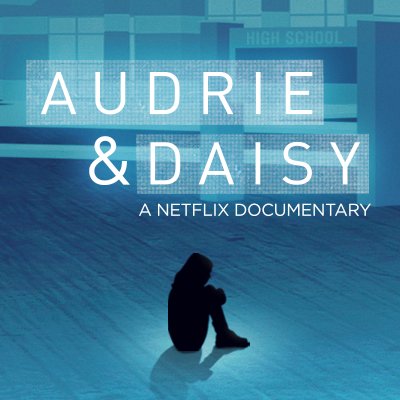For more, check out all of our movie reviews.


My heart is broken right now. Broken. I was not even two-thirds of the way done with Netflix’s documentary Audrie & Daisy before I clenched my fist and wanted to use it to punch the iPad onto the floor. I was so angry for Daisy, for the cyberbullying that happened to her after her alleged rape, for the victim blaming she received from the sheriff, for the suicide attempts that seemed like her only option.
And then, moments after I thought my heart couldn’t be in more pieces, the next voice over happened. It was Daisy’s mom recalling how the family home was burned down.
Burned. Down.
Daisy Colemen was allegedly raped as a 14-year-old child. I say allegedly in the way you have to say it in print. Not because I don’t believe her, but because her attackers were never brought to trial for the rape, which angers me more. And her house was burned down because people are awful and hateful and ugly sometimes.
October is National Bullying Prevention month, which seems like a good time for me to mention this documentary to you. It begins with Audrie Pott, a young girl who was sexually assaulted when she was drunk at a high school party, and, within a week, had committed suicide because of the photos and rumors in circulation. She received justice, albeit posthumously.
So many young girls don’t report sexual assaults. I don’t have the statistics on it because that’s an impossible statistic to have. You can only record data on attacks that were reported. It’s impossible to know how many have gone unreported. Just check your Facebook and Twitter feeds and see how many women are sharing “Me Too” in solidarity with victims of assault.
Audrie & Daisy came out before #MeToo started trending. Before celebrities like America Ferrera shared about being sexually assaulted at age 9. Nine, you guys. Nine. Someone should have done better for her. Someone should have done better for Audrie. And someone needs to do better for Daisy.
She seems to have forgiven her attackers. She doesn’t want to live each day holding onto anger. I applaud her for that. Forgiveness can heal her heart, but it doesn’t change that her assault happened. Forgiveness doesn’t make that disappear.
I can’t hold on to the anger that Daisy let go of. That serves no purpose. What I can do, though, is encourage you to stream this right now. It’s streaming on Netflix now, and you can set up screenings for schools and other settings via www.audrieanddaisy.com. And when you’re done, you can find out how to be a voice for the survivors. Or be an advocate or a listener or just talk to one young person about not objectifying someone (just like Daisy’s older brother does in the film).
***
It’s not just about Audrie or Daisy or the other survivors in the documentary. It’s also about your classmate, your neighbor, your teammate. It’s about you and me and Kesha and Taylor Swift.
Gosh, it’s just about doing the right thing at all times, not sexualizing young women for wearing shorts to class, and not saying that provokes uncontrollable hormones young men. It’s about teaching those young men how to be decent human beings and not accept spaghetti straps as an invitation for sex.
It’s about understanding that if this happens, it’s not your fault. If someone takes advantage of you, you didn’t provoke it or ask for it or deserve for it to happen. It’s about this quote from Taylor Swift’s sexual assault trial: “I am not going to allow your client to make me feel like it is any way my fault because it isn’t.” The man in her case was fired because of the incident, because he grabbed Taylor inappropriately, and he had the audacity to blame her for getting him fired. She shot back: “I am being blamed for the unfortunate events of his life that are a product of his decisions and not mine.”
Victims don’t want to get in trouble. Delaney Henderson, another strong survivor in the film, didn’t report her sexual assault for months. And between when it happened and when it was reported, her attacker assaulted someone else. So don’t be afraid to report what happened. What happens to that person is a result of his (or her) actions, not yours.
***
No means no. Silence, because a victim is too drunk to form words, means no. Yes means yes unless it is changed to no. At any time. Then it’s a no.
My heart is broken for Daisy, but it was put back together knowing that she and two other survivors created the website SafeBAE, an organization raising awareness about sexual attacks in middle and high schools. Because it happens, even in middle school, even if you want to turn a blind eye and pretend it doesn’t.
Watch Audrie & Daisy. Break your heart. It’s worth every second.
